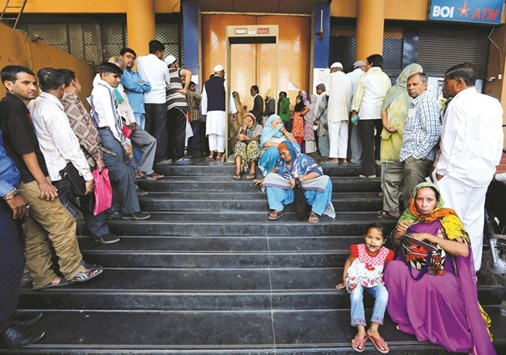As Indians struggle with the chaos caused by last month’s sudden banning of their Rs500 and 1,000 notes, money-laundering networks are spreading across the country, seizing on a new market in helping people turn their cash hoards into legal tender.
While people have until year-end to deposit old notes in their bank accounts, the government has said it will scrutinise large cash deposits and money with undeclared origins – and will tax or penalise depositors. That has created a scramble for ways to turn black money into white.
Agents offering to launder money are using creative means, including flying banned cash by the planeload to northeastern states exempt from restrictions as well as connecting people to high-turnover businesses that can deem old cash as revenue, keep a portion of it, and return the rest, according to people involved in the networks.
Premiums range from 10% to 50%, depending on the difficulty, they say. At least one property brokerage is offering to arrange the sale of apartments using banned money in an upscale Mumbai suburb.
While the government has been working to close loopholes – which Prime Minister Narendra Modi decried as people’s “illegal means to save their ill-gotten wealth” in a radio address last week – new ones are opening even faster. So far, the policy aimed at reducing the scale of the black economy and bringing more people into the tax net is, in the short term, leading to just the reverse: money-laundering, tax-avoidance, and new opportunities for existing organised crime, the evolution of the long-standing hawala money-transfer system, and the start of new illicit networks.
Money-laundering networks promise to deliver clean cash by routing it through India’s hinterlands. One method relies on high-turnover businesses, such as trading houses or manufacturing operations, which report cash revenue to the government. With their sales disrupted by millions of Indians’ sudden inability to access cash, these businesses can make up the shortfalls by accepting old cash from money-laundering networks, calling it revenue, and then returning a portion – typically 50% of the total – in new notes.
Ashok from Mumbai, who did not want to disclose his full name due to the illegality of the transaction, said that a lawyer he contacted after the November 8 cash ban put him in touch with a cash-reliant business in Rajasthan, which has operations in both garment manufacturing and jewellery. He plans to give the business Rs200mn ($2.9mn) worth of banned notes he obtained from selling property, he said, and expects to get just Rs100mn back in brand-new notes.
Other laundering networks focus on bringing the money into the system through the bank accounts of people with tax exemptions, such as farmers or those who derive income from agricultural activities, a Mumbai-based lawyer said. Certain tribal communities in the northeastern states, including Nagaland, Manipur and Tripura, are exempted from paying taxes on income from any sources.
Some of the operators are turning to the hawala system. By using the hawala networks, agents offer to replace old currency notes with new and offer services to pick up the money in remote locations, the lawyer said.
Individuals are transporting millions of rupees on trains or vehicles, and the big money-laundering networks have been chartering flights to transport crateloads of cash to the northeast from small airfields, the lawyer said.
People are also taking things into their own hands. They use household staff or people with little money to move their currency notes into bank accounts of multiple people below the Rs250,000 limit that triggers inquiries from the tax department. The Reserve Bank of India put limits on transactions “to protect the innocent farmers and rural account holders” from activities of money launderers and legal consequences, according to a statement posted on the central bank’s website on November 30.
There are also reports of temples being used to convert the black money into new currency notes. Donations to religious institutions in old notes are exempt from the ban, but a television channel caught on camera a priest at the Govardhan Temple in Mathura in Uttar Pradesh who offered to convert banned currency notes into new ones. People are also using weddings as a way to deposit the currency into bank accounts, as cash gifts received during marriage are exempt from taxation.
The real estate industry, which accounted for a large share of illicit deals with an estimated 10 to 15% of its transactions done with black money even before the currency ban, is also attracting further investments with banned notes.
An e-mail offer sent out by the Mumbai property brokerage had the subject line, “Under old currency 2BHK Sale Khar West,” which meant that the purchaser could pay in banned bills for 2-bedroom apartments in the upscale Mumbai suburb of Khar. The offer price, for unwits in a seven-story building with floor-to-ceiling windows, was about Rs30mn, or about a 10% premium over other comparable sales.

People wait for a bank to open to withdraw and deposit their money in Ahmedabad yesterday.
